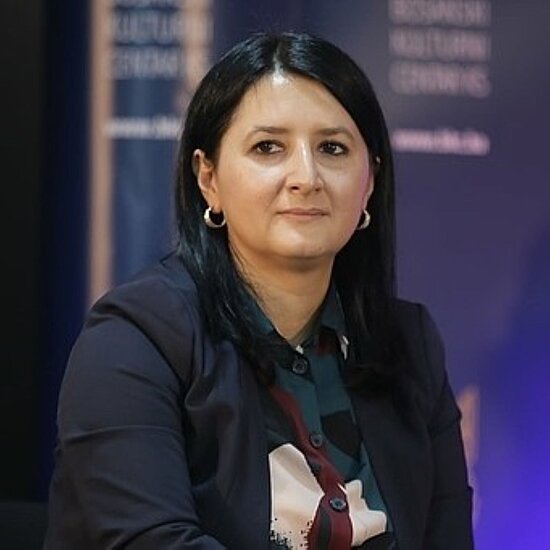Assist. Prof. Amina Isanović Hadžiomerović

CG1: Peacebuilding and Intercultural Dialogue in Adult Learning and Education
Co-Moderator: Assoc. Prof. Dr. Larisa Kasumagić-Kafedžić
Insecurity, violent confrontations, and societal polarisation are all becoming more prevalent in today's extremely complicated world.
Adult learning and education (ALE) should not evade its responsibility to contribute to peacebuilding and promoting intercultural dialogue as a way of facing these challenges. Peacebuilding features as a prominent topic in UNESCO’s documents from 1974 Recommendation concerning Education for International Understanding, Co-operation and Peace and Education relating to Human Rights and Fundamental Freedoms to CONFINTEA VII stressing ALE as an important mechanism for implementing, among others, SDG 16 dedicated to building just, peaceful, inclusive, violence free-societies. This role is also reaffirmed in the most recent GRALE 6 Working Paper, where ALE in conflict and post-conflict reconstruction is included among the four key topics. UNESCO’s flagship report, We Need to Talk: Measuring Intercultural Dialogue for Peace and Inclusion, published in 2022, demonstrates the link between intercultural dialogue and peace. However, the intensity and modalities of implementation of ALE in peacebuilding and intercultural dialogue vary across societies, starting with the conceptualisation of interculturality, which is shaped by the historical and socio-political landscape of each individual society.
The relevance of peacebuilding, understood as a core societal value, extends beyond (post)conflict societies and includes those facing political tensions and social polarization. This further reflects on modes of integrating peacebuilding into ALE, designing learning opportunities, thematic focus, and educators’ competencies. ALE for peacebuilding and intercultural dialogue can take up different forms (education programs, initiatives, movements) and employ a variety of learning techniques (e.g., role plays, case studies, discussions, coaching, etc.).
The expected learning outcomes of this comparative group are: (1) to analyse approaches to peacebuilding and/or intercultural dialogue in ALE in different countries; (2) to understand how these approaches are shaped by the broader socio-cultural and political context of the given country.
- Isanović Hadžiomerović, A., Isanović H., Çapkın D.F. (2024). Challenging transformative learning and circular thinking in an architecture study program. In Žiljak, T., Ristord, P., Alfrijević, N., Pavičić, J. (eds). Lifelong Learning for Green Skills and Sustainable Development in the European Context. Palgrave & Springer
- Isanović Hadžiomerović, A. (2024). Questioning assumptions for developing andragogy study program in Bosnia and Herzegovina, Studies in Adult Education and Learning, Vol. 23, No. 1 (2024)
- Isanović Hadžiomerović, A. (2023). Beyond quantitative measures: Researching identity formation and development through qualitative paradigm, Context 10:1 (2023), 53-74
- Mavrak, M., Badurina, M., Isanović Hadžiomerović, A. (2024). Andragoški priručnik za zdravstvene stručnjake u zajednici [Andragogical Handbook for Medical Professionals in the Community]. Sarajevo: fami Foundation & Federal Ministry of Health. Available from: https://www.fondacijafami.org/Publikacije/PUB_Prirucnik_AP_SOZNJZ_BOS_/mobile/html5forpc.html
- Isanović Hadžiomerović, A., Pfanzelt, A, Pfanzelt H. (2022). Qualitative Study on Adult Education in Bosnia and Herzegovina. Bonn-Sarajevo: DIE & DVV International. https://www.dvvinternational.ba/fileadmin/files/bosnia-and-herzegovina/Documents/Publications/Studija_BSC_bosnia_- _English.pdf
- Isanović Hadžiomerović, A. (2018). In Search of Identity: Adult Education in Bosnia and Herzegovina between the Socialist Legacy and Neoliberal Tendencies, Studies in Adult Education and Lifelong Learning, Vol. 24 No 4, pp. 37-52
Her interests are in Adult Education Policy, Lifelong Career Learning, Evaluation in Higher Education
Assist. Prof. Amina Isanović Hadžiomerović teaches Adult Education, Career Guidance, Evaluation in Education and Research Methods at the Faculty of Philosophy, University of Sarajevo (Bosnia and Herzegovina). She is also head of the Lifelong Learning and Continuing Education Center at the same Faculty.


